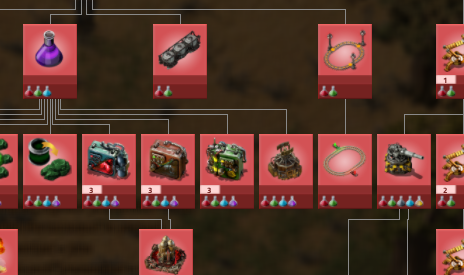As you play through a video game you get a very clear sense of progression from beginning to end. Sometimes this is like an arcade game, where you progress to the next level, and you are challenged even more. Here I will talk about skill and tech trees, those video game systems that layout a very clear series of checkpoints of player empowerment. The common factor in trees is that it isn?t linear, you can choose (to a degree) how you will be empowered, and the requirements to meet are well understood.
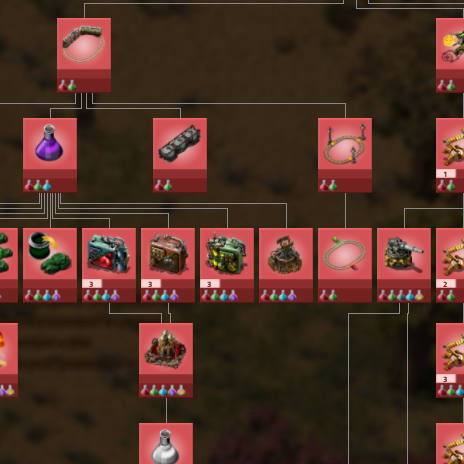 Factorio?s in-game tech tree.
Factorio?s in-game tech tree.
What?s the difference?
A tech tree and skill tree can often be mistaken for one another.
Tech trees have a very deliberate and logical progression. You must build with wood and stone, before you can use metal and glass. That?s not arbitrary, that?s mimicking real life. Tech trees make a lot of sense in their requirements like this, like requiring that you learn how to tame animals before you can learn how to ride them.
Skill trees offer no such logic. A skill tree can be entirely arbitrarily defined. That is not to say that the developer can?t meticulously place skills in a certain order to encourage the player down a path to meet a specific need. However, often enough you?ll find that given enough time in a game a skill tree can be completely filled out. Just as often still you?ll notice that you don?t need to fill out an entire skill tree to complete the game and feel fulfilled.
A technology tree item would allow you to build something that makes you stronger or faster, but a skill tree item allows you to actually be stronger or faster. Tech trees are what you have, skill trees what you are. Superman has mastered his skill tree, while his nemesis Lex Luthor has likewise mastered his tech tree. In short, tech trees enable you, while skill trees empower you.
Tech Trees
I there are two flavors of tech trees. For lack of better terms I?ll call them solid and fluid.
A solid tech tree is most often seen in simulation-like games where you build your world from nothing to something very impressive. The Civilization games come to mind first, but it doesn?t have to be a turn-based strategy game. Factorio, The Sims, and Starcraft all have solid tech trees.
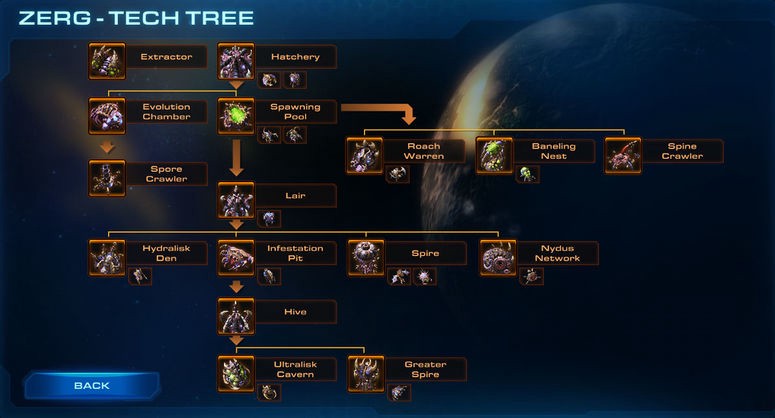 The Starcraft 2 Zerg race?s tech tree.
The Starcraft 2 Zerg race?s tech tree.
They?re solid because you know what comes next. You can view your tech trees in their entirety and plan meticulously the order you want to progress in. Strategy games will probably almost always have these type of tech trees. I call them solid because you are omniscient about their progress. The gates to progress are shown to you in broad daylight. Perhaps a better name for these, then, would be strategic tech trees. I?ll keep with solid because strategic could be misleading.
Fluid tech trees are both hidden and more open-ended. You are not told how to progress, only that there is a resource you don?t have. You don?t know how to get it, but you know what to do with it once you have it.
Subnautica comes to mind first, but also Slime Rancher, Astroneer, Minecraft, and even No Man?s Sky. These games tend to be open-world and focus on exploration. With fluid tech trees you acquire technology that allows you to explore more than you could before. This exploration yields the discovery of new technology, and the cycle continues. Your ability to explore and discover are constantly empowered until the original resources are seen as weeds, getting in the way of finding the best and rarest resources.
Fluid trees like this try to match your pace. If you dive dangerously head-first into the unknown you expect high-risk-high-reward returns. You can explore quickly, or slowly and methodically, but because it?s based on exploration you will progress at your own pace. You can burn through advancement slowly or very rapidly and it won?t ever matter.
 Part of the Civilization 5 tech tree, showing Animal Husbandry and Horseback Riding.
Part of the Civilization 5 tech tree, showing Animal Husbandry and Horseback Riding.
By Example ? Tech Trees
For solid tech trees like Civilization you are required to research technology over the game?s turns. For those new to Civilization it is a turn-based strategy game where you construct whole civilizations, engage in diplomacy and war to meet your needs of victory over the other civilizations present and controlled by AI or other human players.
Your cities produce research like a resource akin to money. It is spent, when enough is gathered, on unlocking technology for your cities to produce with another resource. The more you focus on technology the faster your civilization will churn through unlocks. The catch is that if you burn through the tech tree to fast you won?t have time to make use of everything you are being given access to. You have a limited pool of resources, and dividing them up between technology and other goals is one of the balancing acts you must engage in.
Having access to siege engines is useless if you don?t have enough resources to create one because those resources are being exhausted on more technology. You may know how to build a tank, but if you don?t have one you can still succumb to an enemy?s low-tech swordsman and archers.
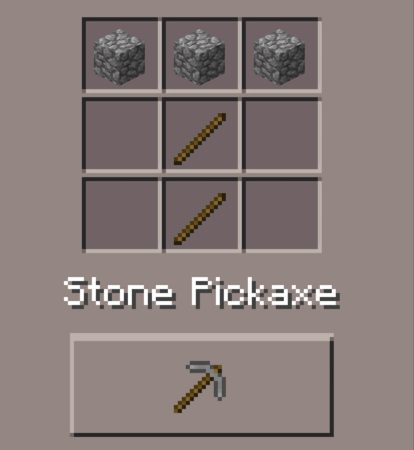
Fluid trees I think are best represented by minecraft. The voxel-based sandbox open-world game allows you to collect resources in first person. You can gather dirt, stone, and wood without any tools ? which acts as your starting technology. With stone and wood you can make basic, but inefficient tools. Though they are not good, they are better than your base hands which you?ve been using up till then. With stone you can move to iron, and from iron you ca collect diamonds, the ultimate in tool making resources.
This progression is fluid, because to find iron you have to dig deep into the earth in search for it. As minecraft worlds are procedurally generated there?s no telling how far down you need to go, or in what direction exactly. You simply dig until you get lucky. There are other things to do, and with each update that list grows larger and larger. Some areas have great rewards, but are equally as dangerous. Having a measly stone sword will offer you too little protection, so to reap these rewards it is in your best interest to look for iron first.
That?s not to say you can?t go into the dangerous areas anyway, if you feel confident in your skills at the game you could try your luck. In this way the progression is fluid, moving at your pace.
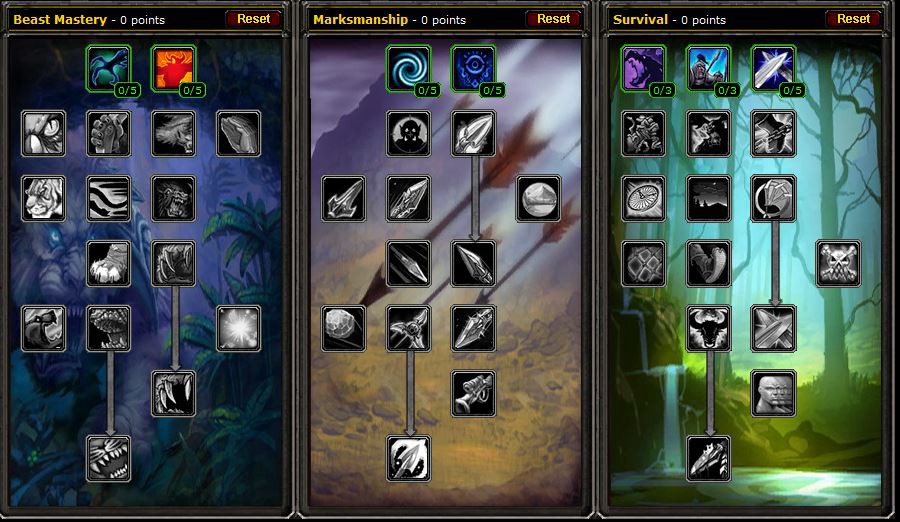 The announcement of WoW Class has some players eagerly awaiting returning to its older skill tree system.
The announcement of WoW Class has some players eagerly awaiting returning to its older skill tree system.
Skill Tree Primer ? RPGs
Role-playing games, or RPGs, come in two flavors. Those that are labeled RPGs and those that aren?t. What ?an RPG? has come to mean isn?t strictly that it is a game where you play a role, and if this seems counterintuitive that?s because it is. Part of learning about video games is learning some jargon and terms commonly used.
What we call RPGs are those where the player can choose their role. Their in-game character is a hollow container, a blank canvas to be filled with whatever the player desires both in personality and in-game abilities. RPGs let you be a tough guy, mowing down evil as it is convenient to you. RPGs let you be a saint, taking on a mission from your patron deity to rid the world of corruption. You can be a mercenary, a wise old sage, a young rookie trying to prove himself, or whatever other classical archetype you see fit.
A breed of RPG is one where your choices aren?t as free and open. Perhaps you are given a small list of roles to play. There is a balance the designers are trying to do between your freedom and features present in the game. If you can be anything then the designers have to try to design against everything. If you can be 3 or 4 things, the designers? jobs become much easier.
Maybe you are given only a single role to play, but you can play it in a few different ways. There is a subtle difference here. If your role is that of a scientist, you may be given the choice to play your role like a mad genius, or a misunderstood savant. They?re the same role, but you choose the flavor that appeals to you.
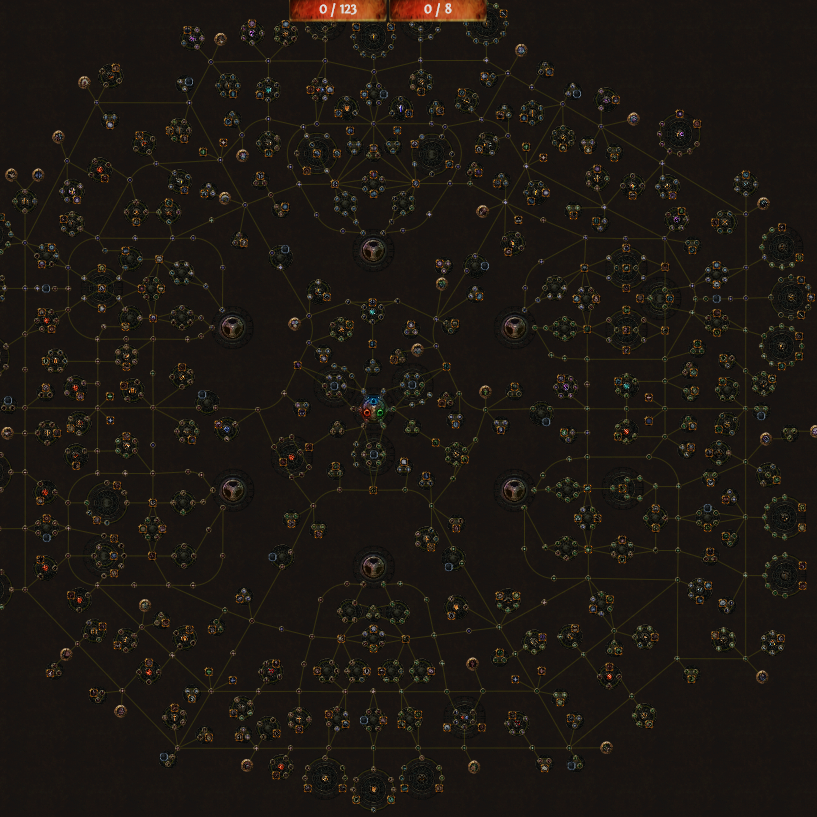 Path of Exile has possibly the largest skill tree of all video games.
Path of Exile has possibly the largest skill tree of all video games.
Skill Trees
Empowerment is more important in some games than others. Those that incorporate some sort of skill tree are looking to allow the player to augment their in-game avatar. In a fantastical world where the laws of physics can be mere suggestions your skill tree can allow you to be larger than life. Always wanted to be an expert in a particular feat? There?s a skill for that.
Often times not all items of a skill tree can be accessed simultaneously, you need to choose who you want to be in this game world. Unlike a tech tree that unlocks more and more items, a skill tree may see fit to force you into an either-or decision. Maybe I can be faster or stronger, but not both. Which do I feel like represents how I want to play this game better?
Games with skill trees are often RPGs, like World of Warcraft (MMORPG), The Elder Scrolls series (open-world RPG), or Path of Exile (ARPG). All of these games let you take on a persona as you see fit, and play the game as the character you most want to be. The degree of control can vary, but the focus is squarely on being whoever you want to be.
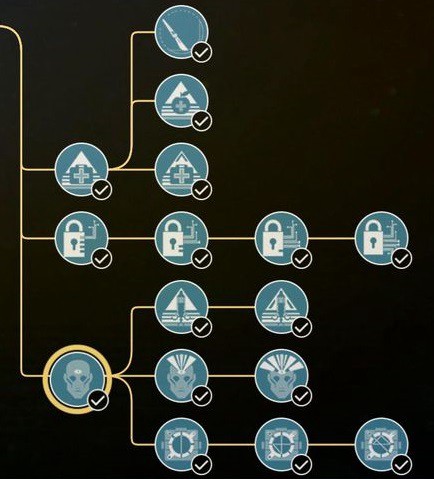 Part of Prey?s skill tree system.
Part of Prey?s skill tree system.
On the other hand, there are games with skill trees not called RPGs. As mentioned before these usually include a single or small number of roles. Far Cry (open-world FPS), Prey (FPS), both of Assassin?s Creed: Odyssey & Origins (Action-Adventure), and Spider-Man (2018). These games drop you into a well established world as a somewhat established character. You can?t make Spider-Man a villain, but you can use the skill-tree to tailor combat in this role how you prefer.
Worth noting here is Borderlands, a particular blend of ARPG (Action-based Role Playing Game) and FPS (First Person Shooter). This blend has been so successful it has spawned its own label ? looter shooter.
Also worth noting are MOBA games (DoTA, LoL, and HotS) that often provide skill trees either in-game or out-of-game. These can improve and refine your characters specific to the character or universally to all characters.
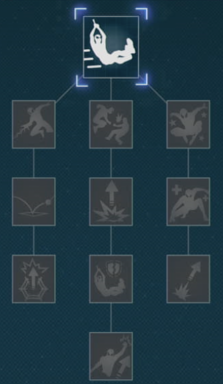 One of the Spider-Man (2018) three skill trees.
One of the Spider-Man (2018) three skill trees.
By Example ? Skill Trees
Spider-Man(2018) has RPG elements, but it is labeled as an Action-Adventure game because you are only given a single role (that of the masked vigilante super hero Spiderman). You will swing around New York City all the same, stick to walls all the same, but possibly beat up bad guys differently. Your play style may enjoy beating up said evil-doers a bit differently than someone else. A skill in a skill tree may see silly and largely useless to you, but amazing and incredibly powerful to someone else.
Regardless of how you play the skill tree should be able to empower you, which brings this game?s enjoyment to a wider audience of gamers.
